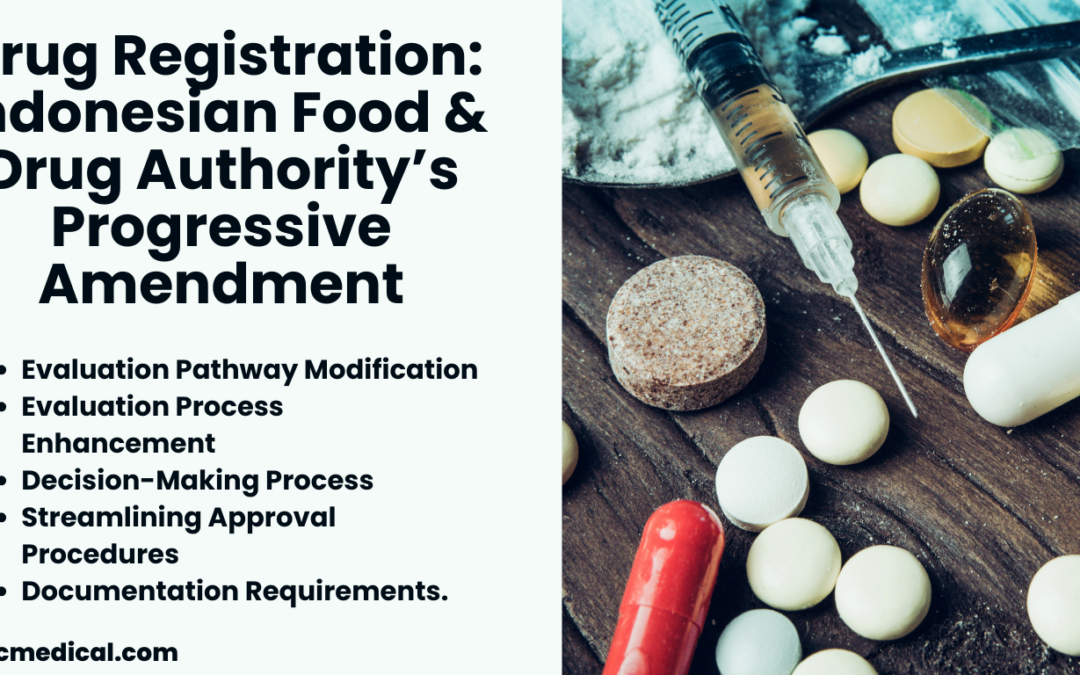Drug Registration – The Indonesian Food and Drug Authority (BPOM) plays a crucial role in ensuring the safety and efficacy of pharmaceuticals within the Republic of Indonesia. In 2019, the BPOM made a significant stride towards enhancing public services and aligning regulations with the evolving landscape of medicine.
Regulation Number 15 of 2019 amended the existing Regulation Number 24 of 2017, specifically focusing on the criteria and procedures for drug registration.
This amendment reflects a response to the changing legal needs and advancements in science and technology within the pharmaceutical sector.
Background and Objectives
The amendment, guided by the considerations outlined in the regulation, aims to accelerate public services by streamlining drug registration processes.
The provisions related to the drug evaluation pathway and the approvable letter, as specified in the previous regulation, were deemed outdated and incongruent with the current state of legal requirements and scientific advancements in the field of medicine.
Legal Framework
The amended regulation takes into account various legal documents, including Law Number 36 of 2009 on Health, Presidential Regulation Number 80 of 2017 on the Indonesian Food and Drug Authority, and Regulation Number 26 of 2017 on the Organization and Work Procedures of the Indonesian Food and Drug Authority.
These legal foundations provide the framework for the BPOM to exercise its authority and fulfill its mandate.
Top 5 Key Amendments for Drug Registration
1. Evaluation Pathway Modification
One of the significant changes introduced by Regulation Number 15 of 2019 is the restructuring of the evaluation pathway for drug registration. The amendment categorizes the evaluation process into different timeframes based on the nature of the drug and its intended use.
Notable pathways include a seven-day pathway for export-specific registrations, a 40-day pathway for minor variations, and extended pathways for critical drugs and new developments.
2. Evaluation Process Enhancement
The amendment also focuses on refining the evaluation process. Article 45 now mandates a comprehensive evaluation of efficacy and safety data, guided by scientific evidence and safety efficacy assessment guidelines.
The National Committee for Drug Evaluation plays a pivotal role in reviewing evaluation results and providing recommendations to the Head of the Agency.
3. Decision-Making Process
Article 49 has been revised to emphasize that the decision to approve or reject a drug registration application is based on evaluation results, recommendations, and local examinations at the drug manufacturing facility.
The decision, communicated to the Registrant, reflects a commitment to maintaining rigorous standards and ensuring compliance with administrative requirements.
4. Streamlining Approval Procedures
Article 51 introduces clarity in the approval process, specifying that marketing authorization, approval for special export, or approval for variation registration will be issued in writing to the Registrant.
Notably, drugs not yet produced on a commercial scale may receive an approvable letter, facilitating the preparation for commercial-scale manufacturing.
5. Documentation Requirements
The completeness of pre-registration documents is detailed in the annex, outlining administrative, quality, nonclinical, and clinical document requirements.
The stringent criteria for reference countries, patent-related documentation, and the role of the Directorate General of Intellectual Property in patent searches underscore the commitment to thorough scrutiny.
Effective Date and Implementation
Regulation Number 15 of 2019 came into effect on July 17, 2019, under the leadership of the Chairperson of the Indonesian Food and Drug Authority, Penny K. Lukito. The regulatory changes were subsequently promulgated on July 18, 2019, emphasizing transparency and ensuring public awareness of the modifications.
The amendment to Regulation Number 24 of 2017 marks a progressive step by the Indonesian Food and Drug Authority in aligning its regulations with contemporary legal needs and technological advancements.
By streamlining evaluation processes, enhancing decision-making criteria, and specifying documentation requirements, the BPOM demonstrates its commitment to ensuring the safety, efficacy, and timely availability of pharmaceuticals for the Indonesian public.
As the pharmaceutical landscape continues to evolve, such regulatory adjustments are crucial to maintaining a robust and responsive healthcare system.
